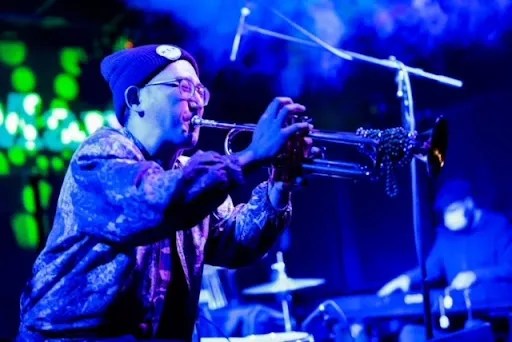
Yo-Yo Photography

Audio By Carbonatix
On a chilly November day, Kazunori Tanaka sits outside with his trumpet case and a shot of liquor after playing a set of jazz with his band, Texas Sloth Loincloth.
“Snarky Puppy has a dog in its name,” the musician says, joking about the parallel with the Grammy-winning Denton-based band. “Sloths are my favorite animal, and also it’s difficult for me to pronounce,” he says of his soft-spoken Japanese accent. “My second favorite animal is a hedgehog, so maybe I’ll name my next band that.”
Tanaka learned to play jazz back in his native Japan, and moved to the States six years ago to further his musical education.
“My father was a trumpet player too, and he would always say, ‘Make money first,’ ” Tanaka says. “His genre was enka, which was older Japanese pop music, World War II swing-style dance music.”
Tanaka has been everywhere in Dallas’ music scene since his arrival to the city.
“I’m a 6-year-old baby in Dallas, so I almost get culture shock every day,” Tanaka says.
His first experience as a newly local musician came when he played with the University of North Texas’ prestigious all-student band.
“So I got a scholarship to the jazz program at UNT, and that was the best, cheapest option,” he says. “Played in the [school’s] One O’Clock Lab Band and all that … but the city of Dallas almost educated me more than any school.”
Since graduating, Tanaka has played with Dallas acts Dos Negros, Shelley Carrol, Astro James and the Free Loaders.
“I don’t really see myself as a jazz musician, so It’s amazing playing with Bobby Sparks and people like that,” he says of the renowned keyboard player. “Other than Tokyo and maybe Osaka, Japan doesn’t really have a very strong jazz program, [whereas] in the U.S. each city has its own different color and power. New York’s a jazz town. L.A. is a huge commercial music city. Boston’s the first city most Japanese think of for school with Berklee. But Dallas is unique; Erykah Badu [and her band members], Frank Moka, R.C. Williams, all are sort of leading this next generation of music.”
The move to Dallas, Tanaka says, gave him unlimited musical resources.
“Everyone teaches me something every day,” he says. ‘We shouldn’t learn from just school; we should learn from people. Like Frank [Moka] taught me an appreciation for that side of music, the cultural, ritual side … the soulful … I’m not a spiritual guy, but I come from the culture of animism, of Shinto.”
Tanaka says that he doesn’t subscribe to either but grew up influenced by their teachings.
“Everything is connected somehow and there’s communication in everything. If you treat your iPhone poorly, it will eventually become broken; if you treat your people poorly, they won’t be your people.”
Ruminating on the spiritual side of music, he recalls his post-graduation playing.
“After UNT, a friend told me to start coming to Deep Ellum, and that’s when I started playing with John Jay [Myers] and the Free Loaders,” Tanaka says, his eternal wonder reverberating in his voice. “He’s since been one of my biggest supporters, but he has this deep gravelly voice and then my English wasn’t so good so I wouldn’t even understand what he was saying between songs so I really needed to learn them then.”
Deep Ellum, he says, was a true culture shock.
“That’s when I realized that people here dance to music,” he says. “[The Deep Ellum jazz club Myers owns, the Free Man] is a restaurant, but if people feel like dancing they just dance.”
Tanaka says he was fascinated by these rituals and the spiritual aspects of music.
“Music and dance used to be ritual. … It’s such a core part of humanity,” he says. “Singing even came from chanting, so it’s a huge human core thing.”
He may have not have always understood his bandleader’s words, but Tanaka’s work isn’t lost in translation.
“Music is a thing people can share without language,” he says. “It’s most beautiful when it delivers a message and that is called ‘soul.’ But your soul and your technique should be connected, too. Then education serves to boost the soul.”